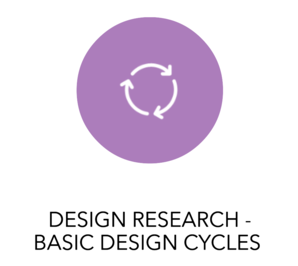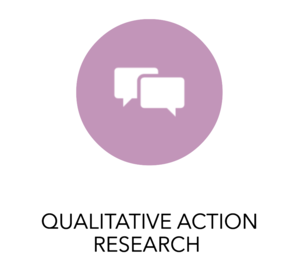Chapter 1. Research / Methodology, Theory and Calendar
How can autonomy and active learning be stimulated in a blended oboe class program?
To answer this question I used design research for developing the online environment and the learning tools for process thinking, in three cycles. The cycles consist of designing the online space and the learning tools, testing, evaluating, making improvements and starting the next cycle. An expert in online learning development, provided me we with regular feedback.
Secondly I used action research to reflect on the program and develop adjustments in my teaching and the students learning. I planned and carried out teaching interventions, evaluating their impact in order to plan and carry out further interventions. A reciprocal dialogue during the lessons, on the teaching and the program shaped the follow-up interventions. The program was developed in response to the learning needs of the students and was a collaborative endeavor. I used teachers' practitioner research in case studies of students, observing their development and learning over the course of the complete research project. The teacher - student dialogue was taken into account together with student feedback in these case studies. I collected material to reflect on the program and my teaching with learning theory frameworks of New Learning and the Self-Determination Theory. The research material on which I reflected was collected through the online learning environment, recorded lessons, questionnaires, case studies and self-study. Self study deepened my values, knowledge and skills as a teacher. The same focus points on active learning, autonomy supportive teaching and self-regulation were guiding in the self-study.
Three experts in teaching the same age groups and with knowledge of the learning theories used, observed my recorded lessons, to compare results with my own findings.
The target group in this research were BASIS oboe students. BASIS is a 4 year music program for young windplayers at the School for Young Talent/ Royal Conservatoire of The Hague. The children were in the age group of 7 till 13 years when the research took place. Some of them have had music tuition before, others came in without prior knowledge.
The three leading learning theories in my action research were: The self-determination theory, New learning, Self-regulation and Quality Practice.
In the first design cycle I wrote case studies per student. Leading in these case studies were thinking frameworks based on the Self-Determination Theory and active learning (learning functions). I reflected on my teaching and the program using the online environment and I developed the first version of the logbooks, self image sheets and weekly reflection sheets.
Main questions in the Self-Determination Theory observations were: Where can I see autonomy, relatedness and competence and how. Main questions in the active learning observations were: Where do I see conscious use of presenting or usage, of learning functions and where do I see aspects of active learning in the teaching and development of students. The conclusions and next steps to take were derived from the case studies.
In the second design cycle I experimented with the use of the complete online environment and personal presence. I introduced the improved learning tools for self-regulation and active learning and observed the use with case studies and analyses of the logbook use. I recorded lessons and analysed them with an observation sheet based on autonomy supportive teaching framework of Reeve and Jang (2006). Furthermore I made a new case study on learning functions with the same student comparing her effectiveness and output over two years.
In the beginning of the second and third cycle I used a questionnaire. Questions were reflective on the tools usage for self-regulation and active learning and on how students perceived autonomy, relatedness and effectiveness in the lessons.
In the third cycle I ordered the tools and the online environment differently to create a clear process overview in three steps: The preparatory; the executive and the closing learning stages. I also created more micro processes in a school year by connecting goals to grouped lessons with the three process stages.
Calendar:
The research took place in the following periods:
September 2019 till February 2020 Literature research on learning theories.
1st February 2020 till June2020 1st Research Cycle
June (2020) till August (2020) reflecting, observing and designing tools and online environment.
2nd August 2020 till December 2020 2nd Research Cycle, implementing findings, tools and online environment improvements.
January (2021) till February (2021) reflecting, observing and designing tools and online environment.
February (2021) till April (2021) 3thd Research Cycle, implementing findings, tools and online environment improvements.
References
Ryan, R.M. , Deci, E. L. (2018) Self-Determination Theory, Basic Psychological Needs in Motivation, Development and Wellness. New York: The Guilford Press
Reeve, J. , Jang, H. (2006) What teachers say and do to support students' autonomy during a learning activity.
Simons, R.J. , van der Linden, J. , Duffy, T. (2000) New Learning. New York, Boston, Dordrecht, London, Moscow: Kluwer Acaddemic Publishers
Schunk, D. H. , Greene, J.A. (2018) Handbook of Self-Regulation of Learning and Performance. London: Routledge
Williams, S. (2017) Quality Practice, A musician's guide. Self-published: Dr. Susan Williams
Natural Trumpet / Performance Science
Koninklijk Conservatorium / Royal Conservatoire The Hague
T. Ryan Thinker Keys Cards

